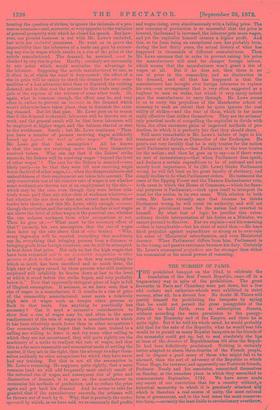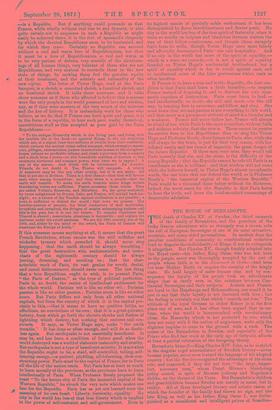THE WORSHIP OF PARIS.
THE prohibited banquet on the 22nd, to celebrate the foundation of the first French Republic, came off in a fragmentary way in spite of the prohibition. The great fireworks in Paris and Chambery were put down, but a few odd rockets and catherine-wheels were exhibited in strict secrecy, after all, to a devout few. No doubt M. Thiers will justify himself for prohibiting the banquets by saying that he could not permit the great panegyrists of the Republic to hold forth, even at subscription dinners, without according the same permission to the panegy- rists of the Monarchy and of the Empire, and there he is quite right. But if he told his whole mind, he would probably add that for the sake of the Republic, what he would best like would be to permit as many Royalist banquets as the friends of the monarchy could get up, but to seal absolutely the lips at least of the devotees of Republicanism till after the Repub- lic had been definitively proclaimed. Nothing is certainly better adapted to alarm three-fourths of the French people, and to disgust a good many of those who might fail to be alarmed, than the sort of advocacy of the Republic to which Victor Hugo, for instance, and apparently our Positivist friends, Professor Beesly and his associates, committed themselves on Sunday, at the nameless place in which they assembled to commemorate September, 1792. We have never made any secret of our conviction that for a country without. historical monarchy to which it is genuinely attached which is therefore a real source of unity, the most rational form of government, and in the best sense the most conserva- tive form,—certainly the least liable to revolutionary overthrow,
—is a Republic. Bat if anything could persuade us that France, while wholly without real ties to any dynasty, is also quite certain not to acquiesce in such a Republic as might easily be achieved there, it is the riot of spasmodic rhapsody by which the devoted Republicans seem to be fascinated, and for which they crave. Certainly no Republic can succeed without a real and warm love of Republicanism, but then it must be a love of Republicanism so real and warm as to be very patient of defects, very sensible of the shortcom- ings of all human things, very tolerant of those who are not Republicans, and very anxious to reconcile them to the new state of things, by making them feel the genuine equity
4;; of their treatment, and the sobriety and rationality of the new regime. The letter of Victor Hugo, read at the Paris banquet, is a shriek, a conceited shriek a fanatical shriek, and an irrational shriek. It talks sheer nonsense, and it talks sheer nonsense as if those who affected to believe this nonsense were the only people in the world possessed of love and wisdom, nay, as if they were masters of the very secret of the universe and the key of history. It is melancholy work for those who believe, as we do, that if France can have quiet and peace, it is in the form of a republic, to hear such poor, washy, theatrical, meretricious stuff as this accepted as pure gold by the Paris Republicans :— "To the antique Monarchy which is the living past, and living with the terrible life of the dead—to spectral Kings, to the old despotism which can, at a signal, draw four millions of swords from their scabbards, which restores the ancient crime called conquest, which strangles, massa- cres, pillages, exterminates, pushes innumerable masses to the slaughter- house, refuses no profitable infamy, and steals a province from a country and a clock from a house—to this formidable coalition of horrors, to this enormous nocturnal and compact power, what have we to oppose ? A ray of the aurora. And which will be victorious ? La Lumiire. Friends, do not doubt it. Yes, France will vanquish. A trinity of emperors may be like any other trinity, but it is not unity. All that is not one is division. There is a first chance—that they will devour each other among themselves; and then there is a second—that the earth will tremble. To make the earth tremble under kings certain thundering voices are sufficient. France possesses those voices. They are called Voltaire, Rousseau, and Mirabeau. No, the great continent, by turns enlightened by Greece, Italy, and France, will not fall back into night ; no, a return of the Vandals against civilisation is not possible ; a town is sufficient to defend the world ; that town we possess. The butcher-pastors of peoples, the blind conductors of deaf multitudes, irruptions and invasions, the deluges of armies submerging nations—all this is the past, but it is not the future. To remake Oambyses and Nimrod is absurd ; resuscitate phantoms is impossible ; and replace the universe under the sword madness. We are the 19th century, son of the 18th, and, either by the mind or the sword, the Paris of Denton will overcome the Europe of Attila."
If this nonsense means anything at all, it means that the great French Revolution, whose excuse was the still selfisher and wickeder tyranny which preceded it, should never stop happening ; that the earth should be always trembling ;' that the great destructive wits, sentimentalists, and icono- clasts of the eighteenth century should be always jeering, dreaming, and mocking on ; that the char- acteristic work of Paris, it vast genius for revolt, denial, and moral dethronement, should never cease. The last thing that a true Republican ought to wish, is to present Paris, "the Paris of Denton," as the type of political perfection. Paris is, no doubt, the centre of intellectual excitement for the whole world. Parisian wit is like no other wit ; Parisian passion is like no other passion ; Parisian scorn is like no other scorn. But Paris differs not only from all other national capitals, but from the country of which it is the capital pre- cisely in this,—that it seems to have no positive faiths, no affections, no convictions of its own; that it is a great galvanic battery, from which go forth the electric shocks and flashes of lightning which destroy, but nothing that restores and con- structs. It may, as Victor Hugo says, make "the earth tremble." It has done so often enough, and will do so doubt- less again. But earthquake is not essentially beneficent. It may be, and has been, a condition of future good, when the world destroyed was a world of elaborate insincerity and cruelty. But earthquake is not a type of beneficent activity. It is not what the Republic ought to be, a staid, self-controlled, toiling, self- denying energy,—a patient, plodding, all-tolerating, slow-con- structing power. Paris must be the capital of France, for to Paris all the life of the nation tends. But Paris has at least as much to learn morally of the provinces, as the provinces have to learn intellectually of Paris. When Professor Beealy proposed the toast "To the heroic city of Paris, the immortal capital of the Western Republic," he struck the very note which makes one
ft fear for the Republic. Paris has as yet not learned even the meaning of its own boast, Liberty, fraternity, equality.' No city in the world has less of that true liberty which is implied in the power of self-restraint and self-government. Even in
; its highest moods of partially noble enthusiasm it has been distinguished by fierce bloodthirstiness and fiercer panic. No city in the world has less of the true spirit of fraternity, when it visits so cruelly on helpless and blameless German waiters the sins of their fellow-countrymen, and thrusts them savagely forth from its walls, though Victor Hugo once most falsely and affectedly denominated Paris one vast hospitality.' And if no city in the world has more of the spirit of equality,— which in a sense we concede,—it is not a spirit of equality founded on Victor Hugo's sentimental brotherhood, but a spirit of equality which is due to revolt against rank, and to intellectual scorn of the false pretensions which rank so often involves.
If France is to have a true and stable Republic, the first con- dition is that Paris shall learn a little humility,—to respect France instead of despising it, and to distrust her own spas- modic impulses of destruction. Paris must learn to lead,— lead intellectually, no doubt, she will and must,—in the old way, by learning first to reverence, and follow, and obey. She must learn that wit and passion is not everything in this world, and that scorn as a permanent attitude of mind is a blunder and a weakness. France will never follow her, France will always be afraid of her. while Paris is the mere iconoclast, without faith and without sobriety, that she now is. There cannot be greater dis-service done to the Republicans than to sing like Victor Hugo and Professor Beesly, these hymns to Paris, who, while she will always be the brain, is just for that very reason, with her inflated vanity and her fumes of impurity, the great danger of the future Republic. If these men were wise, they would tell Paris honestly that she, and she alone, is the difficulty of the young Republic ; that the Republic cannot be safe till Paris is as considerate as she is brilliant ; and that wisdom will not come while she believes herself, in Victor Hugo's almost sycophantic words, the one town that can defend the world, or in Professor Beesly's, "the immortal capital of the Western Republic." Paris would be a thousand times better without its flatterers. Indeed, the worst omen for the Republic is, that Paris hates to hear the truth, and loves the loud-mouthed romancings of democratic adulation.



































 Previous page
Previous page